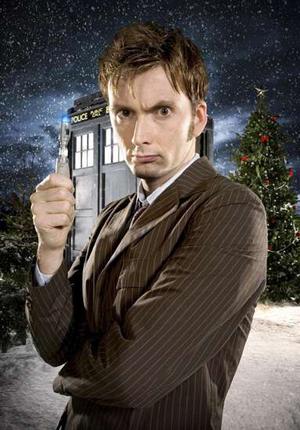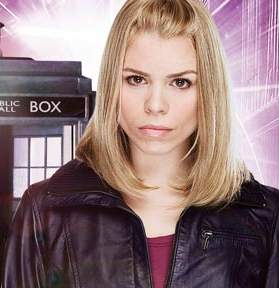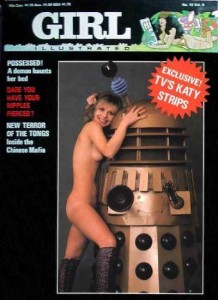Who’s the Boss

Like most people of my age, Doctor Who was one of my favourite shows while I was growing up. My earliest memories of it involve Jon Pertwee, the fourth doctor, and his car Bessie, but to me, the show’s golden era followed in the wake of Tom Baker, who reigned supreme over Saturday evening television in the late seventies and early eighties. [If you want to get specific, the peak was probably Season 17 in 1979-80, with Douglas Adams acting as script editor and Lalla Ward as Romana – the latter being an early schoolboy crush of mine, I vaguely recall]. Interest faded slowly thereafter, though I have some fond memories of Sylvester McCoy, the last before the series went on hiatus at the very end of the eighties.
While I watched the 1996 attempt to relaunch the series, starring Paul McGann, I was supremely underwhelmed, and so didn’t pay any attention to the revival of Doctor Who when it came back to the Beeb in March 2005. Some things are best left to be remembered solely through the rose-tinted glasses of childhood nostalgia, where the bravely limited – and that’s being kind – effects are not such a distraction. Yes, I’m looking at you, Blake’s 7. However, over the festive season, BBC America scheduled a marathon of all the Christmas specials; by chance I stumbled onto the 2007 Voyage of the Damned. I didn’t realize at the time that, when originally screened in Britain, the episode was the second most-watched program of the year, and gave the show its highest ratings in almost thirty years. Having nothing much better to do, I simply gave it a chance, not expecting much at all.
For once, I was wrong and popular culture was resoundingly right. The episode took the standard disaster movie – most obviously, The Poseidon Adventure – and twisted the clichés into strengths, located in a futureverse with imagination oozing from ever scene. The writing and performances were both superb, even Kylie Minogue managing to be more convincing than irritating, and the justly-maligned effects from the original show were gone, in favour of high-quality CGI. The body-count was surprisingly high, but what really mattered were that these were deaths that you cared about, even of characters we’d never seen before. Death is something rarely shown with such harshness on American TV (except as a desperate ratings ploy), but the poignancy of the final moments, where the Doctor thinks he can save someone, only to have the hope snatched away… Okay, I’m hooked. Can the regular series live up to this?
Short answer: yes. Albeit with the caveat that this is based only on what we’ve seen, which is most of Season Four. Led by Russell T Davies and Steven Moffat, the creators have crafted a marvellous body of work, which takes the strengths of the original show, but doesn’t attempt to slavishly ape it, acknowledging that television and culture have both changed radically since the previous incarnation. Gone are the multi-part episodes with cliffhangers at the end of each segment, replaced by stories which generally stand alone, though with occasional over-riding arcs. There are occasionally ones which spread over two parts, but the flexibility this offers, in contrast to the previously-fixed format, allows the writers more scope. I would pit the two-part “Silence in the Library / Forest of the Dead” up against any SF feature film of the past decade, and it would stand up well.

At the core is David Tennant, who is absolutely pitch-perfect, capturing the essential humanity of the Doctor and his absolute alien-ness, both of which are required for the role. Striking the balance is hard [even Tom Baker probably leaned towards the latter], but Tennant does it with effortless ease. You can see why his assistants would follow him, literally, to the ends of the universe, and his benign nature, along with his vastly superior intellect, are never in doubt. It’s a beguiling combination. The companions are a good deal less passive than they used to be too – I seem to recall them spending a lot of time being rescued in the original series, but the new breed are generally competent, self-reliant and smart. Let’s face it, if the show can turn the previously-irritating Catherine Tate into a sympathetic and likable character as Donna Noble, they’re clearly doing something right.
Yet neither Doctor nor companions are mandatory. Consecutive episodes in the fourth season had first one, then the other, all but removed – first, the Doctor went on a solo sightseeing expedition, which went horribly wrong after a presence possessed one of his fellow passengers. then Donna was diverted into an alternate universe, where she turned left instead of right at a junction, and never met the Doctor. That way led to disaster befalling the entire universe, for reasons which became clear in the season finale. It helps that backing up the main characters are just about every famous British actor you can think of, from Felicity Kendall through to Sir Derek Jacobi. I was particularly pleased to see Bernard Cribbins [once I got past the ‘Is he still alive?’ reaction], as I remember him playing an assistant to Peter Cushing in one of the two movies made in the sixties, more than 40 years previously. It’s another way in which the show is aware of its history, without being a slave to it.

However, I have to admit that some of the monsters and adversaries no longer have quite the chill which they created in my childhood. When I heard the phrase, “Ex-TER-min-ate!”, for the first time in forever, I immediately flashed back to a seven-year old kid, peering out from behind a cushion at the TV. I had to explain to Chris the sheer impact of the creatures on my fragile young psyche. However, it’s fair to say that they did not quite live up to my fevered rememberings, and Chris was notably unimpressed, describing them as being more like irritated vacuum-cleaners than anything. I can hardly argue with this as an assessment, despite the upgrades which meant that their plans to conquer the universe would no longer be defeated – as depicted in a famous cartoon – by a flight of stairs. While it’s hard to imagine Doctor Who without them, this is probably one aspect of the show that would perhaps have been best left concealed in the midsts of time. [The image, right, of former companion Katy Manning, suggests I wasn’t the only one for whom Daleks hold no terror…]
All told though, the finale of the series more than lived up to expectations – you have to admire an arch-villain whose plan involves not just the destruction of Earth, or even the entire universe, but also of all parallel universes as well. Think big, that’s what I always say. It’s probably not giving away much to say that the plan was eventually foiled, though with enough of a twist on it to prove largely satisfactory. We’re not just looking forward to season five, we’re already seriously contemplatin splashing out for the first three series on DVD. Though a dark cloud on the horizon is the departure of Tennant as the Doctor after the filming of four specials this season: it’s hard to imagine anyone else taking over the role. However, if the writing remains as consistently excellent as we’ve seen, then we’re confident the series will continue going from strength to strength. I certainly wouldn’t bet against the show enjoying its 50th anniversary, in 2013.
Comments
Mike L: Only *thinking* of getting the first three series on DVD? Rush! Rush to your nearest stockist! I say that as a confirmed hater of old style Who, but the revival has been magnificent. The first series really converted me, it was respectful to the old show but happy to modernise at the expense of the fanboys. Best episodes:
- Dalek – Series 1.
- The Empty Child/The Doctor Dances – Series 1
- The Girl in the Fireplace – Series 2
- Human Nature/Family of Blood – Series 3.
- Blink – Series 3
Most of those are Steven Moffat episodes, which bodes well for the future of the show. I think Eccleston was easily the match for Tennant – without spoiling things too much, there was a deep inner sadness to the Series 1 doctor and by the time you get to “Dalek”, you know why. Although Eccleston is a Serious Actor, he played it perfectly especially considering the pressure they were under bringing it back. He teams up perfectly with… ah, that would be spoiling the fun.
That series and series 2 really show off the Doctor/Rose relationship – plus the fact that Billie Piper is actually a decent actress rather than a teen pop flash in the pan.